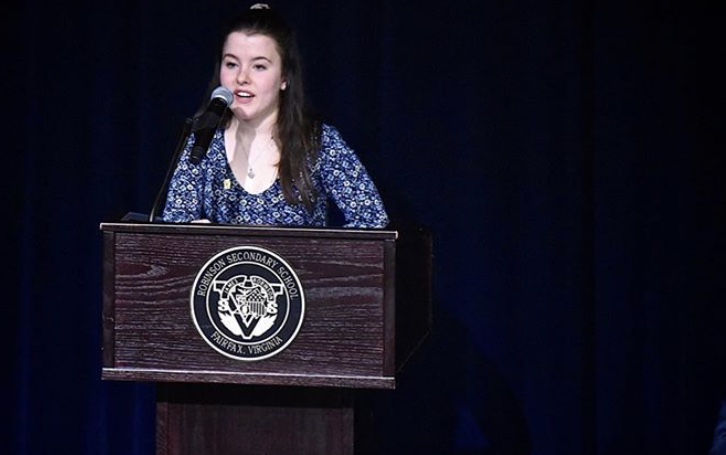Honor Societies: Are they significant to the college admissions process?
Senior Carrie Walker, the National Honors Society president, speaks at the induction ceremony in 2019.
As college enrollment season winds down, students are beginning to receive decisions back from their schools, and it’s generally one of three responses: denied, deferred, or accepted. It’s hard to know how big of an impact factors like extracurricular activities play in a student’s admission decision, but many students participate in activities like sports, clubs, and notably, honor societies. College admissions is an extremely competitive process, and one most Robinson students start planning for at the end of their sophomore year by joining honor societies. Through these societies, students have the opportunity to demonstrate their dedication and interest in a particular subject field through volunteer hours and community service opportunities.
Being in any honor society at Robinson requires a student to earn a certain number of volunteer hours in a particular subject area. For instance, senior Michidmaa Batzorigt explains how her participation in Spanish honor society has benefited her in several ways: “It was helpful to me to be able to tutor students while also earning volunteer hours; it also helped me practice my Spanish and become more fluent,” she says. For many students, this is the case; they join honor societies not only for the positive attributes it can contribute to their college application, but also how it benefits them while still in high school.
Batzorigt highlights how she believes her involvement in honor societies helped to amplify her college application: “a lot of them ask about your involvement in the community, which I was able to answer thoroughly because of my involvement in these honor societies,” she states. For senior Sophia Pak, she notes that she had a similar experience in that her involvement in Math Honor Society and Science Honor Society has allowed her to connect with other students who share the same interests as her while also allowing her to gain her necessary service hours. “I was able to meet a lot of people that I wouldn’t have met through my regular classes, and I also go to tutor other students, which I actually really enjoyed,” comments Pak. However, the benefits of honor societies in the college preparation process isn’t one-dimensional. Pak, who was accepted into the University of Virginia, cites that although her involvement in these programs weren’t added to her college applications like Batzorigt’s were, her time spent in them will help her prepare for post-secondary life regardless. “My involvement has taught me to manage my time more since each society I’m involved in have different requirements that can take up a lot of time.”
So, while some students might disagree on whether or not involvement in honor societies contributes to a university’s admissions decision, it’s clear that it makes a significant difference in a student’s high school experience. For students like Batzorigt, it can help to enhance skills in a particular subject area while also adding positive weight to a college resume. And for students like Pak, it can assist in gaining volunteer hours while requiring students to practice essential life skills like time management and daily planning.



